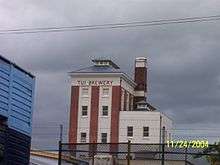Mangatainoka

Mangatainoka is a small settlement in the Tararua District of New Zealand's North Island. It is located on the banks of the Mangatainoka River, 5 km (3.1 mi) north of Pahiatua. The 2001 New Zealand Census of Population and Dwellings gave its population as 1,617, consisting of 858 males and 759 females, representing a decline of 7.4% or 129 people since the 1996 census.[1] However, this figure covers not only the Mangatainoka township, but also the rural area on all sides of Pahiatua, and this includes other small settlements that are not part of Mangatainoka proper.[2]
Tui Brewery

Mangatainoka is home to the nationally famous Tui Brewery. The community facilities include a hotel, school, golf course (Pahiatua), railway station on the Wairarapa Line.
Railway history
The railway was opened to Mangatainoka in August 1897 and the settlement was briefly the terminus of the Wairarapa Line until the final section to a junction with the Palmerston North–Gisborne Line in Woodville was opened on 11 December 1897.[3] Passenger train services were originally provided by the Napier Express until it was re-routed via the former Wellington and Manawatu Railway Company's western line through the Kapiti Coast and Horowhenua in early 1909.[4] It was replaced by the Wairarapa Mail, which served Mangatainoka until 1948, when it was fully replaced by the NZR RM Wairarapa class railcars that had begun operating some services in 1936.[5] Standard and 88 seater class railcars also operated to Mangatainoka, especially after the Wairarapa railcars were withdrawn in the wake of the Rimutaka Incline's 1955 closure. Carriage trains through Mangatainoka were reintroduced in 1964 but did not fully replace the railcars until 1977. As roads in the area improved through the 1980s, passenger numbers declined and all services north of Masterton ceased on 29 July 1988. Since this time, only freight trains have regularly operated through Mangatainoka; passenger services have been limited to occasional excursions, typically organised by enthusiast societies.[6]
References
- ↑ Mangatainoka Community Profile
- ↑ Map showing the extent of the statistical Mangatainoka area
- ↑ Geoffrey B. Churchman and Tony Hurst, The Railways of New Zealand: A Journey Through History (Auckland: HarperCollins, 1991), pg. 160.
- ↑ J. D. Mahoney, Kings of the Iron Road: Steam Passenger Trains of New Zealand (Palmerston North: Dunmore Press, 1982), pg. 51.
- ↑ Mahoney, Kings of the Iron Road, pp. 81-86.
- ↑ Churchman and Hurst, The Railways of New Zealand, pp. 161-2.
Coordinates: 40°26′S 175°52′E / 40.433°S 175.867°E